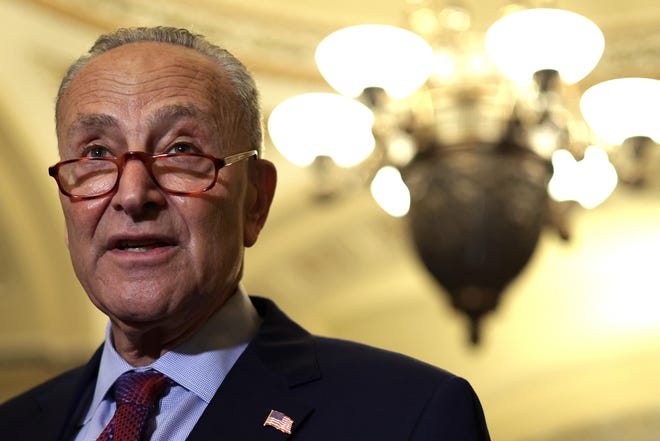
WASHINGTON – Despite nearly 24 hours of debate that began at roughly 9 a.m. Friday and dragged on as the sun rose Saturday, senators remained engaged – but groggy - in the debate over the relief bill.
Some senators appeared to nod off at their desks, stirring in time to cast their votes on amendments. Others moved around, as if to stay awake. Senate Majority Leader Chuck Schumer, D-N.Y., began chatting about "Baconators," a Wendy’s breakfast sandwich, as he spoke with Virginia Democrat Mark Warner about food options.
At one point, New Jersey Democrat Cory Booker emerged from the nearby cloakroom to vote on an amendment. When Montana Democrat Jon Tester raised his hand to get the attention of the clerks, Booker tried to bat it down. After both of their votes had been recorded, they pretended to punch each other's arms, and Booker returned to his cloakroom retreat.
A muted cheer arose in a chamber where the average age is 61 and several are 80 or older after Kansas GOP Sen. Jerry Moran proposed that amendments going forward be decided on voice vote, a much faster process than the roll-call process that requires the Senate clerk to read the name of each senator and ow they voted.
That idea didn’t take root. The next vote, an amendment proposed by Sen. Marsha Blackburn, R-Tenn., to strike certain types of Medicare hospital payments, failed – on a roll-call vote.
– Ledyard King
Senate pulls an all-nighter in debate on COVID relief bill
The Senate continues to wrangle over the fate of a massive new COVID-19 stimulus package that includes direct $1,400 payments after a lengthy debate that began Friday and stretched into early Saturday.
Bleary-eyed senators are approaching their 20th straight hour of negotiating passage of President Joe Biden's $1.9 trillion American Rescue Plan in the evenly divided Senate. Republicans are continuing to propose amendments to the bill in an effort to delay passage though none of them are winning enough votes to pass.
The Senate narrowly amended the bill to include a $300 weekly federal unemployment benefit through August after West Virginia Democrat Joe Manchin objected to a provision in the House-passed measure which included a benefit of $400 per week.

An effort to reinsert a provision raising the federal hourly minimum wage to $15 failed Friday when eight Democratic caucus members joined all Senate Republicans in voting against Vermont independent Bernie Sanders' proposal. The provision was included in the bill the House passed but was stripped by the Senate parliamentarian who ruled it was not germane to the relief bill and could not be included.
More:5 charts show the wide gap between Biden's, Republicans' coronavirus aid proposals
Democrats cannot afford a single defection in the face of united Republican opposition to the bill but they also have to walk a delicate tightrope. If Democrats cut back too much in the Senate to secure the vote of moderates in their party, they risk losing the progressive House votes that would be needed to send the final bill to Biden for his signature.
– Ledyard King and William Cummings
Source link










